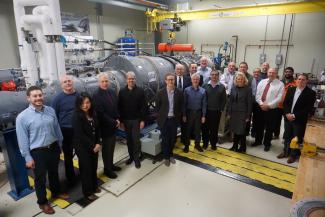The project team developing the National Experimental Turbine (NExT), an initiative advanced with NETL support and oversight, has surpassed several key milestones as it builds a first-of-its-kind testing platform for manufacturing a new generation of higher-efficiency gas turbines.
Gas turbines play an important role in U.S. energy security and represent a critical technology for energy conversion, with broad uses for combined cycle power plants, aircraft propulsion, and backup power generation for renewable energy plants and hospitals. Technological strides in turbine development can have wide-reaching economic and environmental benefits. According to data presented at the 2019 American Society of Mechanical Engineers TurboExpo, a one-point U.S turbine efficiency improvement, in terms of carbon reduction, is equivalent to eliminating the emissions from 2 million cars.
To improve gas turbine performance and efficiency, component cooling, particularly of turbine blades and vanes, is essential. However, the geometries of these and other components are highly proprietary. NExT will address this issue by providing a modern turbine design that can be used by multiple organizations to advance turbine aerodynamics and cooling.
The primary goal of the NExT initiative, based at Penn State University’s Steady Thermal Aero Research Turbine (START) Lab, is to develop a modern research turbine for U.S. manufacturers and institutions that provides a platform for acquiring detailed data to be used for new design method development and new design concept validation. When completed, NExT will allow collaborating partners to quickly and relatively inexpensively manufacture efficient engines that generate fewer emissions while using domestic natural gas as a fuel. In a recent update, the NExT project team announced it has delivered all design parameters, computer-aided design models and drawings for rig hardware, along with the relevant flow and operational conditions that allowed the internal analyses of the NExT design.
Turbine components such as blades and vanes operate in extreme environments and must be able to withstand high temperatures. The challenges presented by this environment have led to many novel developments in engineering and materials science. Among these developments are cooling holes and geometric designs that envelope the turbine air foils (vanes and blades) in a layer of enhanced air flow. As the NExT project advances, researchers will pursue vane and blade manufacturing using both additive and traditional casting processes to allow a back-to-back comparison between the two manufacturing techniques and their corresponding effects on turbine efficiency and durability. The first set of NExT hardware will be additively manufactured turbine blades and vanes and will arrive in the second quarter of 2022 for installation. To expedite the casting process, the team is exploring the use of rapid core and wax pattern manufacturing to reduce the casting timeline. The cast blades and vanes will arrive in early 2023.
In total, this research will enable assessment of various cooling technologies by looking at how well they cool the blades and the practicality of the manufacturing technology.
Collaborating with NETL and Penn State on the NExT initiative are turbine manufacturers Honeywell, Pratt & Whitney, Solar and Siemens-Energy in partnership with Agilis, a turbine design firm. Representatives from these industry partners and various federal agencies, including the U.S. Department of Energy, the U.S. Air Force, Naval Air Systems Command and NASA, serve on the NExT Computational Advisory Board. The board ensures data and baseline results are distributed with industry partners so they can be further computationally optimized and then tested to advance the efficiency of gas turbines.
NETL is a U.S. Department of Energy national laboratory that drives innovation and delivers technological solutions for an environmentally sustainable and prosperous energy future. By leveraging its world-class talent and research facilities, NETL is ensuring affordable, abundant and reliable energy that drives a robust economy and national security, while developing technologies to manage carbon across the full life cycle, enabling environmental sustainability for all Americans.
Top: Researchers gather at Penn State University where work is underway on the National Experimental Turbine (NExT) initiative.




